Dylan H. Jones's Blog
May 20, 2017
Crime Fiction and Cybercrime: An Expert's Point Of View.
p.p1 {margin: 0.0px 0.0px 0.0px 0.0px; font: 12.0px Helvetica; color: #4787ff; -webkit-text-stroke: #4787ff} span.s1 {font-kerning: none; color: #000000; -webkit-text-stroke: 0px #000000} span.s2 {text-decoration: underline ; font-kerning: none; -webkit-text-stroke: 0px #4787ff}
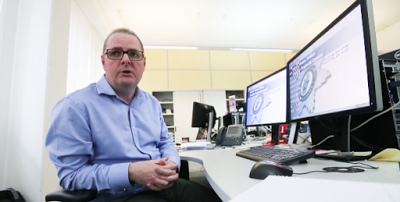 Today, I share my enlightening interview with Chris Walsh, Detective Constable Cybercrime Unit at the North Wales Constabulary, who kindly donated his time to answer some burning questions I had on Cybercrime and how it’s depicted in the pages of crime fiction. I learned a thing or two, I hope you will too.
Today, I share my enlightening interview with Chris Walsh, Detective Constable Cybercrime Unit at the North Wales Constabulary, who kindly donated his time to answer some burning questions I had on Cybercrime and how it’s depicted in the pages of crime fiction. I learned a thing or two, I hope you will too.
Thanks for agreeing to be on the other end of the interrogation process, Chris. Can you give me a quick overview of your work? As Detective Constable Cybercrime Unit, my role involves the investigation of cyber dependant crimes that occur within North Wales. These typically include offences such as Hacking, Denial of Service, Ransomware investigations, Online Blackmail. I also provide training to staff in respect of Open Source investigation skills, and as a forensic examiner, I also conduct the technical element of any Cybercrime offence that the department deals with on behalf of my colleagues.
What led you the cyber-crime field? My background has been traditional Criminal Investigation at local, force and regional level including covert policing, however, I have also worked within the force Hi-Tech Crime Unit as a forensic examiner and therefore have a combination of skills that suit Cybercrime, which is the knowledge of an investigator with the additional technical skill set.

We see dramatic depictions of cyber-tracking criminals, but is it mostly long hours spent looking at a computer screen? Anyone who owns a mobile device such as a phone is carrying a tracking device, so that is often the easiest way to track an individual. Also, the applications on a device can also be used to identify an individual’s location at a given time, however obtaining that data can often be a challenge as we are reliant on third parties such as social media companies who do not need to comply with UK legislation as they are often based outside the UK. So yes, time is spent at a computer screen, but usually either applying for or reviewing communication data, but considerable time is also spent trying to prove the criminal offence was committed by that individual.
How do criminals attempt cover their digital footprints? There are a multitude of applications and devices available on the open market which will allow an individual to either mask their true physical location or leave no trace of their criminal activity on a device if used correctly. Access to these applications is also often free as it is open source, however, a degree of knowledge is required to configure and use those applications correctly, which is often the downfall of many. It would be inappropriate of me to provide any specific information on current criminal methodology that is not in the public domain.
Where do you see the most troubling developments in cyber-crime? Encryption and the reliance of individuals and organisations on technology which is either poorly configured or open to abuse.
What makes for a successful cyber-crime investigation?Early contact and intervention which enables critical data to be obtained, and a thorough investigation by trained and knowledgeable investigators.

How do you keep one step ahead of the cyber criminals?I don’t know about keeping ahead of them, but I personally try to keep pace by reading numerous blogs, websites, forums etc to keep current of trends and methods used by cyber criminals, and where appropriate I attend training courses that equip me with specific technical skills.
For crime writers, there’s a lot to get wrong about the work of cyber-crime detectives, what’s the biggest thing we writers get wrong? In fairness, writers tend to be far more accurate that directors! Watching films and programmes where an investigator copies the contents of a computer to a USB stick in about 30 seconds always makes me laugh nearly as much as a typical TV surveillance follow involving one car directly behind the target vehicle. I think the difficulty for a writer is to convey what can be technical acts done by a criminal in a way that a typical reader can understand.
In these days of globalization, cross-border cyber-crimes must be hard to track. How do you work with your international counterparts?This depends to a degree on the seriousness of the offence. There is a huge difference between someone selling stolen property in a Facebook buy/sell group, which may require data from Facebook to further the investigation, and an organised crime group in Russia, for example, writing malware that affects thousands of computers. There are information sharing agreements in place between certain parties at various national/international levels, however, these can often be time-consuming to undertake.
Any advice for crime writers out there looking to weave in a cyber-crime story into their next book? I’ve got plenty, we just need to work out my commission rates J
Thank you, Chris. The check is in the post :-) Dylan H. Jones is the author of Anglesey Blue, a crime fiction novel and the first in the DI Tudor Manx series.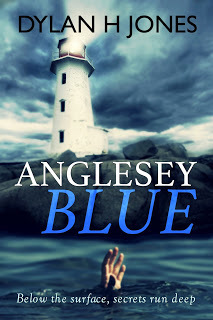
 Today, I share my enlightening interview with Chris Walsh, Detective Constable Cybercrime Unit at the North Wales Constabulary, who kindly donated his time to answer some burning questions I had on Cybercrime and how it’s depicted in the pages of crime fiction. I learned a thing or two, I hope you will too.
Today, I share my enlightening interview with Chris Walsh, Detective Constable Cybercrime Unit at the North Wales Constabulary, who kindly donated his time to answer some burning questions I had on Cybercrime and how it’s depicted in the pages of crime fiction. I learned a thing or two, I hope you will too.Thanks for agreeing to be on the other end of the interrogation process, Chris. Can you give me a quick overview of your work? As Detective Constable Cybercrime Unit, my role involves the investigation of cyber dependant crimes that occur within North Wales. These typically include offences such as Hacking, Denial of Service, Ransomware investigations, Online Blackmail. I also provide training to staff in respect of Open Source investigation skills, and as a forensic examiner, I also conduct the technical element of any Cybercrime offence that the department deals with on behalf of my colleagues.
What led you the cyber-crime field? My background has been traditional Criminal Investigation at local, force and regional level including covert policing, however, I have also worked within the force Hi-Tech Crime Unit as a forensic examiner and therefore have a combination of skills that suit Cybercrime, which is the knowledge of an investigator with the additional technical skill set.

We see dramatic depictions of cyber-tracking criminals, but is it mostly long hours spent looking at a computer screen? Anyone who owns a mobile device such as a phone is carrying a tracking device, so that is often the easiest way to track an individual. Also, the applications on a device can also be used to identify an individual’s location at a given time, however obtaining that data can often be a challenge as we are reliant on third parties such as social media companies who do not need to comply with UK legislation as they are often based outside the UK. So yes, time is spent at a computer screen, but usually either applying for or reviewing communication data, but considerable time is also spent trying to prove the criminal offence was committed by that individual.
How do criminals attempt cover their digital footprints? There are a multitude of applications and devices available on the open market which will allow an individual to either mask their true physical location or leave no trace of their criminal activity on a device if used correctly. Access to these applications is also often free as it is open source, however, a degree of knowledge is required to configure and use those applications correctly, which is often the downfall of many. It would be inappropriate of me to provide any specific information on current criminal methodology that is not in the public domain.

Where do you see the most troubling developments in cyber-crime? Encryption and the reliance of individuals and organisations on technology which is either poorly configured or open to abuse.
What makes for a successful cyber-crime investigation?Early contact and intervention which enables critical data to be obtained, and a thorough investigation by trained and knowledgeable investigators.

How do you keep one step ahead of the cyber criminals?I don’t know about keeping ahead of them, but I personally try to keep pace by reading numerous blogs, websites, forums etc to keep current of trends and methods used by cyber criminals, and where appropriate I attend training courses that equip me with specific technical skills.
For crime writers, there’s a lot to get wrong about the work of cyber-crime detectives, what’s the biggest thing we writers get wrong? In fairness, writers tend to be far more accurate that directors! Watching films and programmes where an investigator copies the contents of a computer to a USB stick in about 30 seconds always makes me laugh nearly as much as a typical TV surveillance follow involving one car directly behind the target vehicle. I think the difficulty for a writer is to convey what can be technical acts done by a criminal in a way that a typical reader can understand.

In these days of globalization, cross-border cyber-crimes must be hard to track. How do you work with your international counterparts?This depends to a degree on the seriousness of the offence. There is a huge difference between someone selling stolen property in a Facebook buy/sell group, which may require data from Facebook to further the investigation, and an organised crime group in Russia, for example, writing malware that affects thousands of computers. There are information sharing agreements in place between certain parties at various national/international levels, however, these can often be time-consuming to undertake.
Any advice for crime writers out there looking to weave in a cyber-crime story into their next book? I’ve got plenty, we just need to work out my commission rates J
Thank you, Chris. The check is in the post :-) Dylan H. Jones is the author of Anglesey Blue, a crime fiction novel and the first in the DI Tudor Manx series.

Published on May 20, 2017 08:10
March 10, 2017
The Good the Bad and the downright Ugly truth about Self-Publishing. Part One.
 Take One. I'm pounding like a madman at my keyboard, my cappuccino now cold as the December chill blowing in through the half- open door of my favorite Cafe ( Cafe Trieste, in Oakland if you must know) and the soft murmur of daily life providing all the background music I need. Solitude, I'm finding is a dish best served with an accompanying soundtrack of other people. I'm good at blocking out other people: just ask my wife. There's a table full of older women, fresh from their morning workout, next to me. They're loudly debating the upcoming Trump Presidency and comparing iPhone photos of their grandchildren. In a few minutes, a couple of regular characters will make their daily entrance: the wild-eyed Asian guy of an indeterminable age who likes to sing along loudly to whatever's playing on his headphones, and the homeless dude who's debating fiercely with whatever noises he's hearing in his own head. It all passes by me like a burbling stream. All life is here. Fodder for the debut novelist. My daily shot of humanity to re-charge the muse. Take Two. I'm writing, but it's not writing anymore- just like Zoo Station isn't really U2 (in fact, are U2 even U2 anymore or just a pale parody? Discuss). Instead, I'm promoting, posting, tweeting, Facebooking- anything that's going to help sell my book. It's the modern curse of the author: they tell you writing a book is hard- marketing the damned thing is harder still. Instead of brainstorming my next enticing plot twist or crafting the next line of sparkling dialogue, I'm emailing my forty-fifth book blogger today in the hope they'll review my book. Truth be told, I must have sent out nearly one-hundred requests in a few days. I received one reply- a tentative maybe- and a deafening silence from the other ninety-nine. Dark Mirror creator Charlie Brooker once summed up social media perfectly- "it's like screaming into an empty bread-bin." That's me. Welcome to the seventh circle of hell, otherwise known as marketing yourself as a self-published author.
Take One. I'm pounding like a madman at my keyboard, my cappuccino now cold as the December chill blowing in through the half- open door of my favorite Cafe ( Cafe Trieste, in Oakland if you must know) and the soft murmur of daily life providing all the background music I need. Solitude, I'm finding is a dish best served with an accompanying soundtrack of other people. I'm good at blocking out other people: just ask my wife. There's a table full of older women, fresh from their morning workout, next to me. They're loudly debating the upcoming Trump Presidency and comparing iPhone photos of their grandchildren. In a few minutes, a couple of regular characters will make their daily entrance: the wild-eyed Asian guy of an indeterminable age who likes to sing along loudly to whatever's playing on his headphones, and the homeless dude who's debating fiercely with whatever noises he's hearing in his own head. It all passes by me like a burbling stream. All life is here. Fodder for the debut novelist. My daily shot of humanity to re-charge the muse. Take Two. I'm writing, but it's not writing anymore- just like Zoo Station isn't really U2 (in fact, are U2 even U2 anymore or just a pale parody? Discuss). Instead, I'm promoting, posting, tweeting, Facebooking- anything that's going to help sell my book. It's the modern curse of the author: they tell you writing a book is hard- marketing the damned thing is harder still. Instead of brainstorming my next enticing plot twist or crafting the next line of sparkling dialogue, I'm emailing my forty-fifth book blogger today in the hope they'll review my book. Truth be told, I must have sent out nearly one-hundred requests in a few days. I received one reply- a tentative maybe- and a deafening silence from the other ninety-nine. Dark Mirror creator Charlie Brooker once summed up social media perfectly- "it's like screaming into an empty bread-bin." That's me. Welcome to the seventh circle of hell, otherwise known as marketing yourself as a self-published author. They don't tell you this shit when you start out. There's no shortage of advice our there for self-publishing- believe me, it's a minefield of information, misdirection, and hyperbole that's going to drive you insane. Really, it will.Take three. I began to drink from the firehose until my head spun and drove myself crazy creating excel sheet of bloggers, press contacts, local bookstores and any place I thought might be interested in a dark crime novel set in Wales with a dysfunctional lead character who's addicted to cheap cigars and carries a dark secret. Add to that workload the blurb writing, the query letter, the web research, the website creation, the Twitter account, the Facebook Page- all otherwise known as my "author platform." I came to call it my "author millstone"- as if I needed any more distractions from actually writing.
They don't tell you this shit when you start out. There's no shortage of advice our there for self-publishing- believe me, it's a minefield of information, misdirection, and hyperbole that's going to drive you insane. Really, it will.Take three. I began to drink from the firehose until my head spun and drove myself crazy creating excel sheet of bloggers, press contacts, local bookstores and any place I thought might be interested in a dark crime novel set in Wales with a dysfunctional lead character who's addicted to cheap cigars and carries a dark secret. Add to that workload the blurb writing, the query letter, the web research, the website creation, the Twitter account, the Facebook Page- all otherwise known as my "author platform." I came to call it my "author millstone"- as if I needed any more distractions from actually writing. 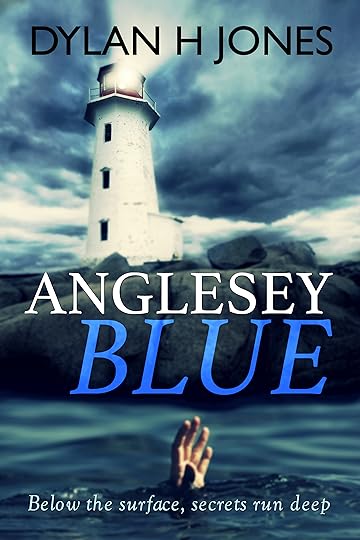 Truth is, self-publishing is hard. Really hard. It's a full-time job done by people who most probably already have day jobs. You can spend a fortune too. Listing your book on book promotion sites, converting your manuscript into the myriad of eBook formats, printing your paperback (margins on these when you sell to bookstores, by they way, are minimal enough to make you weep). Then there's a copy editor to pay for. Don't think you can do this yourself, or that your next-door neighbor who "just loves reading" will spot every typo, misplaced Oxford comma, and grammatical error in your book. They won't, but you know who will? Every other person who reads your book on Amazon and then they'll take great pleasure in pointing them out in their reviews. Really, some people live for that kind of shit.Take four. And, I'm only going to four on this blog, as it's already running long and my second cappuccino's getting cold now too. Don't loose hope. Okay, it's a lame platitude, but how else are you going to justify the thousands of author-hours, missed soccer games and moody nights at the dinner table because your day's writing sucked? By believing in yourself and your work, that's how. If your work is good, it will find it's audience. If it's not quite ready for prime time yet then forget all the noise and stressing out about platforms, bloggers, and other bullshit and just re-write until it hurts. Next time. Adventures with agents and how I secured a publishing deal, and what I'd wished I'd done differently when I self-published. Dylan H. Jones is a crime fiction author and owner of Jones Digital Media, an Oakland-based video content agency. His debut novel, Anglesey Blue, was launched March 1st with Bloodhounds Books.
http://a.co/8NAekZa
Truth is, self-publishing is hard. Really hard. It's a full-time job done by people who most probably already have day jobs. You can spend a fortune too. Listing your book on book promotion sites, converting your manuscript into the myriad of eBook formats, printing your paperback (margins on these when you sell to bookstores, by they way, are minimal enough to make you weep). Then there's a copy editor to pay for. Don't think you can do this yourself, or that your next-door neighbor who "just loves reading" will spot every typo, misplaced Oxford comma, and grammatical error in your book. They won't, but you know who will? Every other person who reads your book on Amazon and then they'll take great pleasure in pointing them out in their reviews. Really, some people live for that kind of shit.Take four. And, I'm only going to four on this blog, as it's already running long and my second cappuccino's getting cold now too. Don't loose hope. Okay, it's a lame platitude, but how else are you going to justify the thousands of author-hours, missed soccer games and moody nights at the dinner table because your day's writing sucked? By believing in yourself and your work, that's how. If your work is good, it will find it's audience. If it's not quite ready for prime time yet then forget all the noise and stressing out about platforms, bloggers, and other bullshit and just re-write until it hurts. Next time. Adventures with agents and how I secured a publishing deal, and what I'd wished I'd done differently when I self-published. Dylan H. Jones is a crime fiction author and owner of Jones Digital Media, an Oakland-based video content agency. His debut novel, Anglesey Blue, was launched March 1st with Bloodhounds Books.
http://a.co/8NAekZa
Published on March 10, 2017 09:26
October 6, 2016
It took 43 years to write my debut novel. Here's why I'm glad it took so long.
I began writing my first novel at the age of ten. It was probably inspired by the horror books I was addicted to at that age, the Pan Book Of Horror Stories.
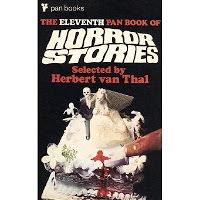 These gothic slices of macabre were my bedtime books of choice, and no doubt led to some nighttime terrors of my own. But I wasn’t about to allow anything as mundane as a nightmare detract me from devouring these stories like Halloween candy.
These gothic slices of macabre were my bedtime books of choice, and no doubt led to some nighttime terrors of my own. But I wasn’t about to allow anything as mundane as a nightmare detract me from devouring these stories like Halloween candy.
My book, as you might have guessed, never made it past the first few pages and ended its brief, uneventful life in the bin, where it belonged.
Fast forward forty-three years and I’ve just self-published my grown-up crime- fiction novel, Anglesey Blue. I could bullet-point a whole litany of reasons why it took so long, but I looking back, I’m glad I had four decades of experience to write from.
Life, they say, gets in the way. So it was with me. An interesting job that fueled my creative side, a family, a move to America, all good reasons, or excuses, to put that ambition on the back burner. After all, there was always tomorrow.
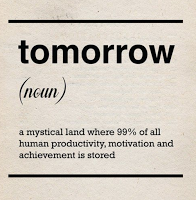 Some writers bloom early, some later, some never at all. For me, the pieces fell into place three years ago. I’d made an aborted attempt at a novel: a family drama set in Northern California. It had some good moments, some great ones maybe, but it never held together as a story. It felt more like a collection of character sketches looking for a plot. This too ended up in its rightful resting place. But this time, instead of waiting another 43 years, I took away two valuable lessons.
Some writers bloom early, some later, some never at all. For me, the pieces fell into place three years ago. I’d made an aborted attempt at a novel: a family drama set in Northern California. It had some good moments, some great ones maybe, but it never held together as a story. It felt more like a collection of character sketches looking for a plot. This too ended up in its rightful resting place. But this time, instead of waiting another 43 years, I took away two valuable lessons.
1. Nothing you write is ever wasted.
2. Forcing yourself to sit down and write every day makes you a better writer.
It’s not that I had nothing to say when I was younger; I just didn’t know how to say it well. Experience matters, but what you learn from that experience matters even more.
Finding the right lead character, crafting a compelling plot, learning that brevity is the soul of great writing came together when I had the idea for Anglesey Blue and the character of Detective Inspector Tudor Manx.
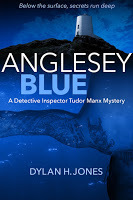 Forty-three years later, I'm holding a printed copy of my debut novel in my hand and celebrating, as would my character Tudor Manx, with a gentleman's measure of Single Malt.
Forty-three years later, I'm holding a printed copy of my debut novel in my hand and celebrating, as would my character Tudor Manx, with a gentleman's measure of Single Malt.
The journey has had its twist and turns, highs and lows, frustrations and elations, but the timing finally seems right. And my advice to any other writers out there on the south side of fifty? Don't wait 43 years to write your book.
As the quote says, "Tomorrow is a mystical land where 99% of human productivity, motivation, and achievement is stored."
But today? That's different. Today is where human inspiration lives. Get up early, write, re-write-write again. Do the same the next day and the next. The words won't always come easy, but nothing worthwhile ever does. Remember, you have a lifetime of yesterdays to draw from, use them, abuse them but above all just sit down and write.
 These gothic slices of macabre were my bedtime books of choice, and no doubt led to some nighttime terrors of my own. But I wasn’t about to allow anything as mundane as a nightmare detract me from devouring these stories like Halloween candy.
These gothic slices of macabre were my bedtime books of choice, and no doubt led to some nighttime terrors of my own. But I wasn’t about to allow anything as mundane as a nightmare detract me from devouring these stories like Halloween candy. My book, as you might have guessed, never made it past the first few pages and ended its brief, uneventful life in the bin, where it belonged.
Fast forward forty-three years and I’ve just self-published my grown-up crime- fiction novel, Anglesey Blue. I could bullet-point a whole litany of reasons why it took so long, but I looking back, I’m glad I had four decades of experience to write from.
Life, they say, gets in the way. So it was with me. An interesting job that fueled my creative side, a family, a move to America, all good reasons, or excuses, to put that ambition on the back burner. After all, there was always tomorrow.
 Some writers bloom early, some later, some never at all. For me, the pieces fell into place three years ago. I’d made an aborted attempt at a novel: a family drama set in Northern California. It had some good moments, some great ones maybe, but it never held together as a story. It felt more like a collection of character sketches looking for a plot. This too ended up in its rightful resting place. But this time, instead of waiting another 43 years, I took away two valuable lessons.
Some writers bloom early, some later, some never at all. For me, the pieces fell into place three years ago. I’d made an aborted attempt at a novel: a family drama set in Northern California. It had some good moments, some great ones maybe, but it never held together as a story. It felt more like a collection of character sketches looking for a plot. This too ended up in its rightful resting place. But this time, instead of waiting another 43 years, I took away two valuable lessons. 1. Nothing you write is ever wasted.
2. Forcing yourself to sit down and write every day makes you a better writer.
It’s not that I had nothing to say when I was younger; I just didn’t know how to say it well. Experience matters, but what you learn from that experience matters even more.
Finding the right lead character, crafting a compelling plot, learning that brevity is the soul of great writing came together when I had the idea for Anglesey Blue and the character of Detective Inspector Tudor Manx.
 Forty-three years later, I'm holding a printed copy of my debut novel in my hand and celebrating, as would my character Tudor Manx, with a gentleman's measure of Single Malt.
Forty-three years later, I'm holding a printed copy of my debut novel in my hand and celebrating, as would my character Tudor Manx, with a gentleman's measure of Single Malt. The journey has had its twist and turns, highs and lows, frustrations and elations, but the timing finally seems right. And my advice to any other writers out there on the south side of fifty? Don't wait 43 years to write your book.
As the quote says, "Tomorrow is a mystical land where 99% of human productivity, motivation, and achievement is stored."
But today? That's different. Today is where human inspiration lives. Get up early, write, re-write-write again. Do the same the next day and the next. The words won't always come easy, but nothing worthwhile ever does. Remember, you have a lifetime of yesterdays to draw from, use them, abuse them but above all just sit down and write.
Published on October 06, 2016 09:50
September 13, 2016
Book Cover Design.
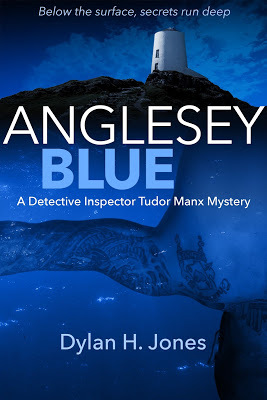
Apparently, a picture tells a thousand words. Hopefully, the design for my book cover speaks for tens of thousands of words- 122,321 to be exact!
Published on September 13, 2016 16:10



